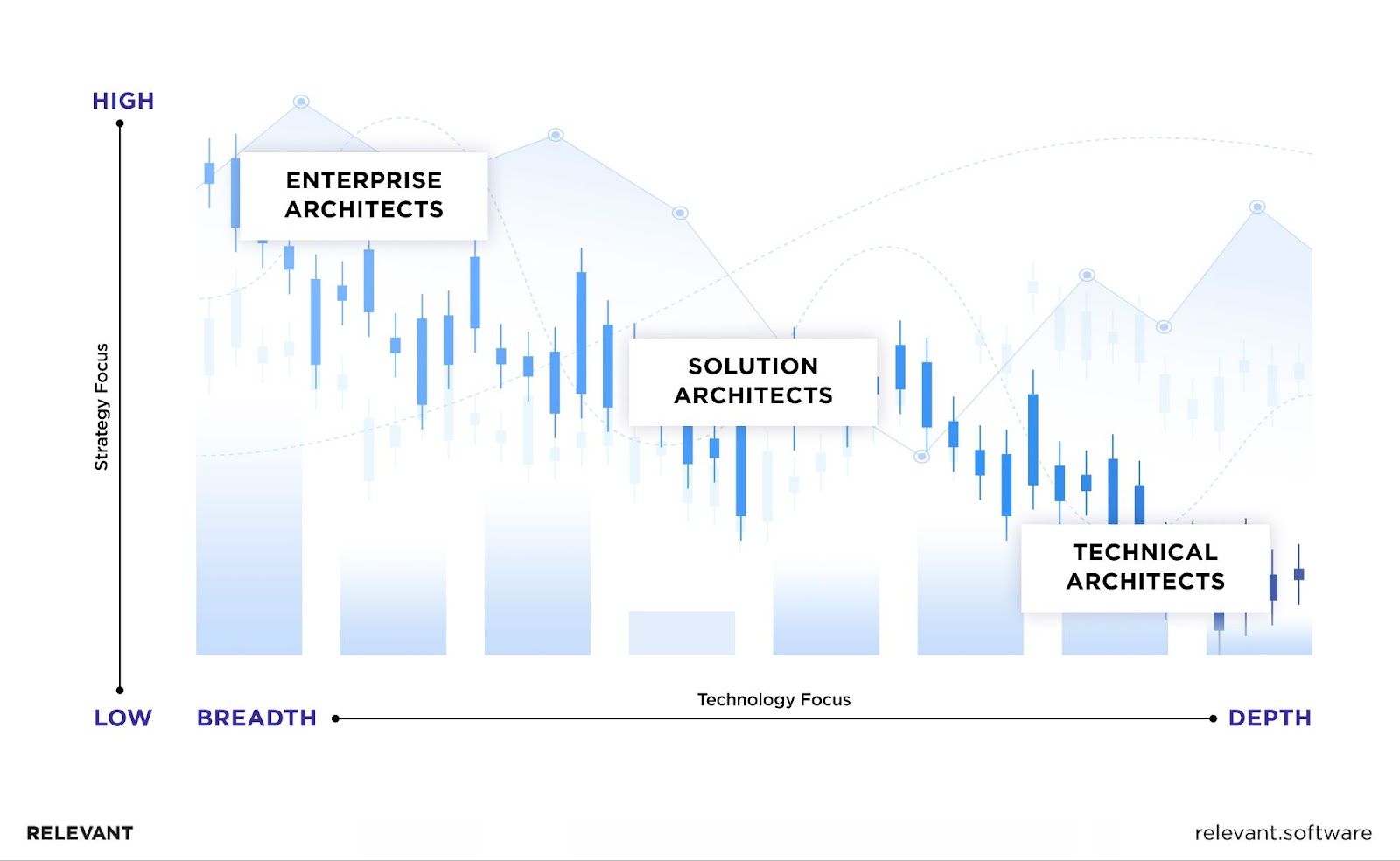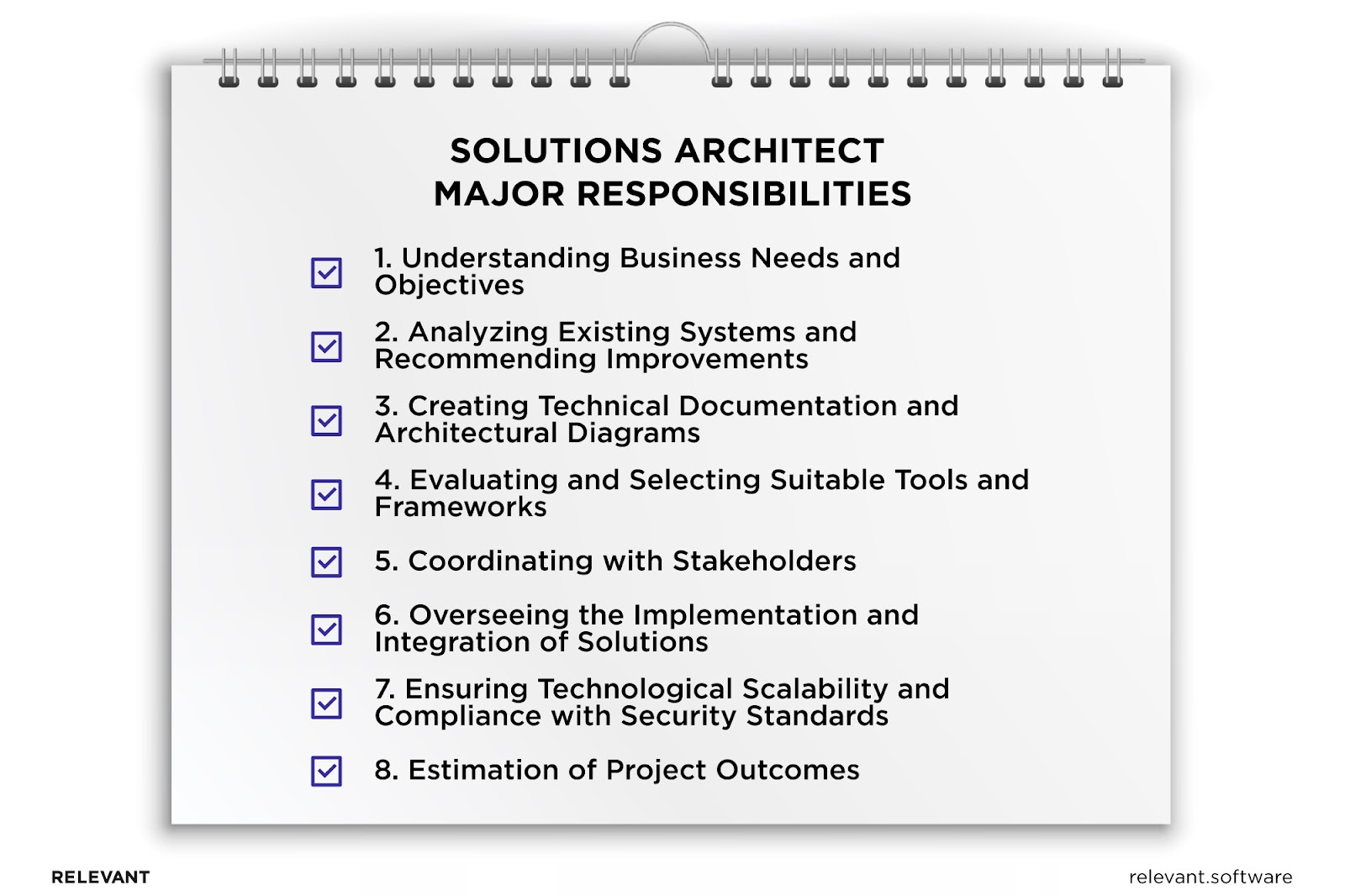The Indispensable Expert: Exploring the Role of a Solution Architect

We are immersed in an era where a solid software infrastructure forms the bedrock of business survival and expansion in today’s market. Consequently, businesses worldwide acknowledge the need to embrace digital transformation, leveraging innovative and advanced software to bolster their initiatives and fuel growth.
That said, it’s undeniable that an all-encompassing digital metamorphosis requires specific competencies and expert understanding to ensure that business imperatives are synchronized with envisioned technological solutions. As such, an IT Solutions Architect’s role becomes important and indispensable to orchestrating this transformation.
from 25 countries outsourced software development to Relevant
We provide companies with senior tech talent and product development expertise to build world-class software.
In this article, we highlight the role of a solution architect and articulate how embracing this particular expertise can be instrumental in resolving business challenges.
What is a Solution Architect?
Dispelling misconceptions about the role of a Solution Architect is a good starting point for gaining a precise understanding of their responsibilities. A widespread misunderstanding is that they are the most skilled developers or experts, extraordinarily adept in the project’s technology stack. However, this is only part of the picture. While possessing a profound understanding of project technologies and demonstrating coding expertise is essential, these are not the only nor the definitive attributes of a Solution Architect.
Primarily, a Solution Architect serves a distinct organizational role centered on designing and managing comprehensive technology solutions that effectively tackle business challenges. They form the crucial bridge between business issues and their technological resolutions, ensuring optimal utilization of the organization’s technological resources.
Deeply rooted in their grasp of architectural principles and technological frameworks as well as their powerful analytical and problem-solving skills, Solution Architects seamlessly translate business requirements into viable technical solutions. As we navigate an epoch characterized by rapid technological advancements, the role of a Solution Architect becomes instrumental in steering organizations toward their envisioned digital objectives.

Solutions Architect Vs. Enterprise Architect Vs. Technical Architect
The architecture field within an IT organization is rich and varied, extending beyond the role of a Solutions Architect. Other crucial roles exist, namely Enterprise Architect and Technical Architect, which contribute significantly to an organization’s IT strategy. While all three professions share some commonalities, they have different focuses.
Enterprise Architect
The Enterprise Architect operates at the macro level, focusing on the overarching IT environment of the organization. They are tasked with defining, maintaining, and enforcing an organization’s architectural vision, ensuring alignment with business strategy. Their scope goes beyond individual projects or technologies, venturing into a holistic understanding of the organization’s technology infrastructure, processes, and strategic goals.
Technical Architect
The Technical Architect, on the other hand, is a specialist. They delve deep into specific technology disciplines, cloud computing, data centers, or cybersecurity. Their proficiency lies in designing, implementing, and troubleshooting within their domain of expertise. The Technical Architect’s role is more granular, working within the framework laid down by the Enterprise Architect, focusing on how specific technologies can be applied to achieve that overarching vision.
Solutions Architect
Solutions Architects exist somewhere between the two. They convert specific business problems into technology solutions. Leveraging their deep understanding of the organization’s technology stack, they design solutions that meet business needs while fitting into the overall enterprise architecture. They bridge the gap between strategy (the realm of the Enterprise Architect) and implementation (the domain of the Technical Architect).
In summary, the Enterprise Architect maps the strategy, the Solutions Architect translates this strategy into concrete solutions, and the Technical Architect applies specific technologies to make these solutions a reality. Each role is distinct yet interdependent, creating a harmonious trinity that guides an organization’s technology strategy from vision to execution.

Essential Skills Required for a Solutions Architect
The role of a Solutions Architect calls for a mixture of technical prowess, architectural understanding, project management competence, and more. Here’s a closer look at some of the essential solution architect skills:
Technical Proficiency
Understanding various programming languages, cloud computing, network and security architecture, data architecture, and database systems is part and parcel of the required technical expertise. Solutions Architects must be fluent in these areas to design robust and efficient solutions that align with a business’s needs and technology infrastructure.
In-depth Knowledge of Architectural Principles and Services
An extensive comprehension of architectural principles and frameworks such as TOGAF or Zachman is indispensable for a Solutions Architect. They must also possess knowledge of service-oriented architecture (SOA), microservices, and API design. This understanding equips them with the ability to structure and design robust, scalable, and sustainable solutions.
Experience with DevOps Practices
Familiarity with DevOps practices like continuous integration, continuous delivery (CI/CD), and infrastructure as code (IaC) is pivotal in the current software development and deployment landscape. Experience with tools like Jenkins, Docker, and Kubernetes is essential to streamline and automate development processes.
Strong Communication and Interpersonal Skills
As the bridge between technical teams and business stakeholders, strong communication and interpersonal skills are crucial for a Solutions Architect. They must effectively articulate technical complexities to non-technical personnel and facilitate discussions to drive consensus and decision-making.
Analytical and Problem-Solving Abilities
The ability to analyze and solve problems is at the heart of a Solutions Architect’s role. They must foresee potential challenges, devise effective solutions, and adapt quickly to changes to ensure the smooth execution of projects.
Leadership and Project Management Skills
Leading projects, coordinating teams, and overseeing the implementation of solutions require exceptional leadership and project management skills. A Solutions Architect must command these skills to ensure the successful and timely delivery of projects.

Solutions Architect Core Responsibilities
The role of a Solutions Architect is paramount in aligning technology projects with business goals. But what does a solution architect do? This multifaceted role involves many responsibilities, a few of which are enumerated below:

Understanding Business Needs and Objectives
The primary responsibility of a Solutions Architect is to understand the business needs and objectives thoroughly. Their expertise in unraveling complex requirements allows them to construct technology solutions that strategically align with and drive the organization’s goals. This ability positions them as indispensable assets to the success of the organization.
Analyzing Existing Systems and Recommending Improvements
Solutions Architects are entrusted with the task of meticulously analyzing existing systems. By identifying potential areas of improvement, they can recommend modifications or enhancements that increase efficiency and productivity. Their keen eye for optimization allows them to drive continuous improvement within the organization’s technological infrastructure.
Creating Technical Documentation and Architectural Diagrams
It is another essential responsibility of a Solutions Architect. This task extends beyond bureaucratic documentation—it is fundamental to ensure that all stakeholders clearly understand the nuances of the solution. By streamlining implementation and operation, these architectural artifacts become invaluable tools in driving project success.
Evaluating and Selecting Suitable Tools and Frameworks
The solution architect’s responsibilities include evaluating and selecting the tools and frameworks that best fit the unique requirements of the solution. Their expertise enables them to optimize the design and implementation process, ensuring the chosen technology stack aligns seamlessly with the organization’s needs.
Coordinating with Stakeholders
Coordination and collaboration with diverse stakeholders is an essential endeavor for Solutions Architects. They serve as the vital liaison, uniting disparate teams and fostering a shared understanding and vision. By adeptly managing and balancing the interests and expectations of stakeholders, Solutions Architects drive seamless project execution and cultivate a collaborative environment.
Overseeing the Implementation and Integration of Solutions
One of the Solutions Architects’ key responsibilities is to oversee solutions’ implementation and integration. They ensure the smooth fit of the solution within the existing architecture and the fulfillment of the defined business objectives. Solutions Architects contribute to successfully realizing the intended outcomes by providing guidance and direction throughout the implementation process.
Ensuring Technological Scalability and Compliance with Security Standards
Undoubtedly, Solutions Architects bear the critical responsibility of guaranteeing that their design solutions possess two irreplaceable traits: technological scalability and compliance with stringent security standards. The ability to scale for future growth is imperative to avoid costly overhauls or system failures. At the same time, adherence to robust security protocols is paramount to safeguard sensitive data and prevent potential breaches.
Estimation of Project Outcomes
In pursuing project success, Solutions Architects wield their expertise to estimate crucial project outcomes. They meticulously analyze various facets such as cost, timeline, and expected returns, weaving together a comprehensive understanding of the project’s viability and potential. This estimation process is a crucial safeguard, ensuring that projects remain within budgetary and time constraints while aligning with the organization’s strategic objectives.
In summary, Solutions Architects bring expertise in understanding business needs, optimizing existing systems, creating comprehensive documentation, selecting suitable technologies, coordinating stakeholders, and overseeing solution implementation. Their role is instrumental in driving the alignment between technology and business, ultimately leading to achieving organizational goals.
Solutions Architect Salary: Overview
The salary of a Solutions Architect reflects their extensive experience and their critical role in driving technological success within organizations. As businesses increasingly rely on complex IT systems and digital transformation, the demand for skilled Solutions Architects continues to surge.
The salary range for Solutions Architects varies based on several factors, including experience, geographic location, industry, and the complexity of projects they undertake. However, it is noteworthy that Solutions Architects are often among the highest-compensated professionals in the IT industry.
| Salary Range | Experience Level |
| $80,000 – $110,000+ | Entry-Level or Junior Solutions Architect |
| $110,000 – $150,000+ | Mid-Level or Senior Solutions Architect |
| $150,000 – $200,000+ | Senior or Lead Solutions Architect |
| $200,000 – $368,000 | Principal or Architectural Leadership Role |
It is essential for organizations to recognize the value Solutions Architects bring to the table and offer competitive compensation packages to attract and retain top talent in this field. Investing in the expertise of a Solutions Architect is not only a prudent business decision but also a testament to the crucial role they play in driving technological innovation and success.
When Does a Company Need to Hire a Solution Architect?
The decision to hire a Solution Architect is a pivotal one that businesses often grapple with. This role becomes vital when an organization intends to undertake significant technological initiatives that warrant technical expertise and understand how such initiatives align with the company’s strategic objectives and overall business model.
A company typically needs a Solution Architect when it is on the cusp of designing, developing, or implementing a sophisticated technology solution to address a specific business issue or realize a particular goal. These intricate problems may be rooted in operational inefficiencies, a need for process automation, or evolving business requirements that necessitate technological adaptation or transformation.
The expertise of a Solution Architect comes to the fore in a multitude of scenarios, including but not limited to the following:
- Technology Platform Migration: This involves transitioning from one technological platform to another, which reasons like cost-effectiveness, enhanced functionality, or better alignment with business needs may trigger.
- New Software Product Development: When the organization considers constructing a new software application or platform, a Solution Architect can ensure that this new development aligns with the existing technological infrastructure and meets the intended business requirements.
- Systems Integration: Synchronizing various software systems or applications, often from different vendors or operating on diverse platforms, requires a solution architect’s strategic oversight.
- Cloud-Computing Implementation: The migration to or implementation of a cloud-computing infrastructure is a significant technological shift that needs the expertise of a Solution Architect to ensure successful execution and seamless integration with existing systems.
- Database System Development: Building a complex database requires a deep understanding of data structures, relationships, and access methodologies. A Solution Architect plays an integral role in ensuring the design and implementation meet the needs of the business.
- Data Analytics Solution Creation: When a company intends to harness the power of data through analytics, a Solution Architect can help design and implement the right solutions to extract meaningful insights.
- Existing Technology Enhancement: Regular upgrades or enhancements to existing technology solutions are crucial to keep pace with evolving business requirements and technological advancements. A Solution Architect can lead such initiatives, ensuring the enhancements align with the overall architectural vision of the organization.
Understanding these scenarios’ complexity and potential impact makes it clear why and when an organization might need to hire an IT Solution Architect.
Summary
Securing the expertise of a solutions architect on your team, whether internally or through a development partner, guarantees a host of undeniable benefits. With their invaluable contributions, you can be confident in achieving optimal project outcomes. Their expertise permeates throughout the Software Development Life Cycle (SDLC), spanning from gathering and understanding specifications to assessing existing systems and synergizing with stakeholders.
At Relevant, we pride ourselves on our team, including seasoned IT Solutions Architects. We have a long-standing presence in the outsourcing market, and our successful collaborations with international businesses, including Fortune 500 companies, stand testament to their skillfulness.
We invite you to explore our top client cases, where you can gain insights into how we have transformed business challenges into success stories and understand the tangible benefits of custom software solutions. Don’t hesitate to contact us to deliberate your software development needs. Rest assured, opting for Relevant means choosing a trusted partner dedicated to your technological success.
FAQ
What is Solution Architect?
The Solution Architect’s role within the IT organization in devising technical solutions that tackle business challenges is fundamental. They collaborate with stakeholders, interpret requirements, and develop comprehensive solutions that combine various technological elements.What are the responsibilities of a Solution Architect?
A Solution Architect’s responsibilities encompass understanding business requirements, designing solutions, liaising with IT and business teams, ensuring adherence to the architectural roadmap, mitigating risks, and communicating the solution design to the relevant stakeholders.What skills does a Solution Architect need?
A Solution Architect should possess a firm understanding of the company’s technology stack, strong analytical skills, adept project management skills, stellar communication skills, problem-solving prowess, and in-depth knowledge of enterprise architecture.What is a Cloud Solution Architect?
A Cloud Solution Architect specializes in devising and implementing solutions on cloud platforms like AWS, Google Cloud, or Microsoft Azure. They are responsible for managing the strategy and execution of cloud services and solutions.What is the difference between a Solution Architect vs. Enterprise Architect?
Both roles are vital, but their primary differentiation lies in their focus areas. A Solution Architect zeroes in on particular business problems and designs solutions. At the same time, an Enterprise Architect surveys the broader architectural landscape across the organization and outlines strategic direction and standards.Solution Architect vs. Technical Architect – what is the difference?
While a Solution Architect focuses on harmonizing technology with business strategy and solving intricate problems across different systems, a Technical Architect delves more into the technology infrastructure and may focus on a specific part of the technology stack.What is the average salary of a Solution Architect?
The Solution Architect salary fluctuates widely, influenced by factors such as geographic location, industry, years of experience, and the complexity of the projects they undertake.What qualifications and experience are required for a Senior Solution Architect?
A Solution Architect professional usually requires a degree in Computer Science or a related field, supplemented by several years of experience in IT or a related field. They must also be versed in architectural principles, frameworks, and software design.What are the job prospects for a Solution Architect?
Given the escalating dependence on complex IT systems and cloud solutions, the job market for Solution Architects is positive. They are sought-after across various industries, particularly in technology and consulting firms.

Hand-selected developers to fit your needs at scale! Let’s build a first-class custom product together.

